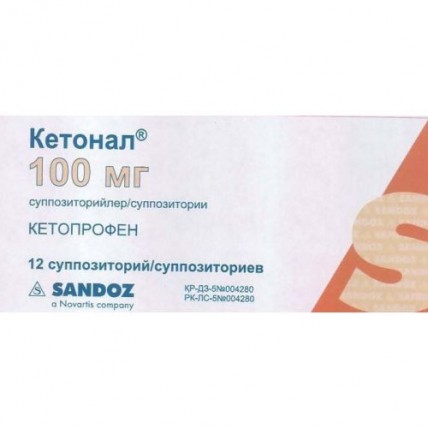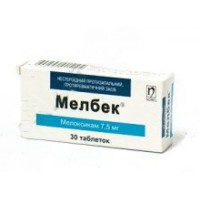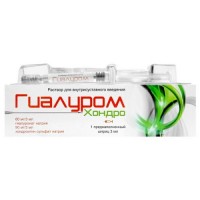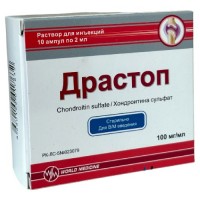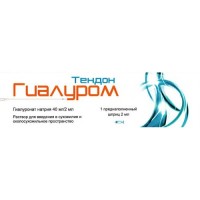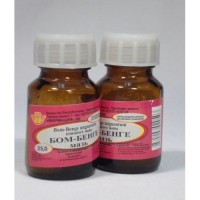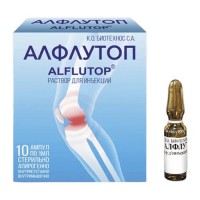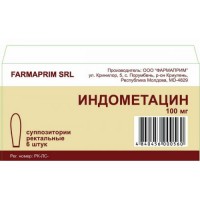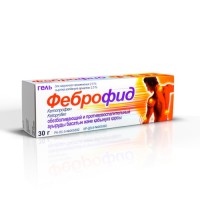Ketonal® (Ketoprofen) 12s 100 mg suppositories
- $16.50
The instruction for medical use
of Ketonal® medicine
the Trade name
of Ketonal®
the International unlicensed
name Ketoprofen Dosage Form
Suppositories of 100 mg
Structure
One suppository contains
active agent – ketoprofen of 100 mg,
excipients: solid fat, triglycerides with an average length of a chain.
Description
White homogeneous uniform suppositories.
Pharmacotherapeutic group
Non-steroidal anti-inflammatory drugs. Propionic acids derivative. Ketoprofen.
The ATX M01AE03 code
the Pharmacological
Pharmacokinetics Bioavailability properties of ketoprofen makes 90% of this dosage form. After introduction rektalno 100 mg of ketoprofen peak plasma concentration (10.4 mkg/ml) are reached during 1 h 22 min.
Ketoprofen for 99% contacts proteins of blood plasma, mainly albumin fraction. The volume of distribution is 0.1-0.2 l/kg. Elimination half-life of ketoprofen makes 1.9-2 hours of plasma. Drug gets into synovial fluid and reaches the concentration equal of 50% plasma there (1.5 mkg/ml). The t reaches ½ ketoprofens from synovial fluid 12 hours.
Ketoprofen is exposed to metabolism in a liver where it conjugates with glucuronic acid. About 75% of ketoprofen are allocated with urine, mainly in the form of a conjugate with glucuronic acid. Less than 10% are removed in not changed view with a stake. At patients with a renal failure ketoprofen is removed more slowly, and its elimination half-life lasts for 1 hour. At patients with a liver failure the concentration of ketoprofen in blood plasma is increased approximately twice that demands purpose of the lowest daily dose.
The pharmacodynamics
of Ketonal® possesses the anti-inflammatory, anesthetizing and febrifugal action.
The mechanism of action Ketonala® is connected with inhibition of biosynthesis of prostaglandins and leukotrienes due to suppression of activity of enzyme of cyclooxygenase (TsOG-1 and TsOG-2) which catalyzes synthesis of prostaglandins from arachidonic acid. Ketoprofen stabilizes membranes of lysosomes and has antibradikininovy activity.
Indications
Pain syndrome:
- posttraumatic
- postoperative
- algodismenoreya
- pain in metastases in a bone at patients with oncological diseases
Rheumatic diseases:
-
- seronegative spondylarthrites (an ankylosing spondylarthritis, reactive arthritis)
- gout, a pseudogout
- an osteoarthrosis
- extraarticular rheumatism (a tendinitis, a bursitis, a capsulitis of a shoulder joint)
the Route of administration and doses
of Ketonal® suppositories enter a pseudorheumatism into a rectum. The adult appoint on 1 suppository (100 mg) of 1 - 2 time a day.
If necessary treatment can be complemented with use of the oral Ketonala® forms, for example, according to the following schemes:
- the patient accepts on 1 Кетонала® 50 capsule of mg in the morning and during the lunchtime, and enters rektalno 1 suppository of Ketonal® in the evening, or
- the patient accepts on 1 tablet Ketonala® forte 100 mg in the morning, and rektalno Ketonal enters 1 suppository (100 mg) in the evening.
The maximum daily dose of ketoprofen should not exceed 200 mg.
Side effects
At assessment of frequency of emergence of different side reactions were used such gradation: 'very often' – ³ 10%, are 'frequent' – from ³ 1% to & lt, 10%, 'infrequently' – from ³ 0.1% to & lt, 1%, is 'rare' – from ³ 0.01% to & lt, 0.1%, is 'very rare' – & lt, 0.01%.
Often:
- dispeptic phenomena, loss of appetite, nausea, vomiting, meteorism, abdominal pains, constipation
Infrequently:
- diarrhea, gastritis
- a headache, dizziness, drowsiness
- skin rash
Seldom:
- hemorrhagic anemia, a leukopenia
- a depression, insomnia, nervousness, paresthesia
- deterioration in sight
- sonitus
- stomatitis, ulcer of stomach and duodenum
- hepatitis, increase in level of transaminases and bilirubin
- increase in body weight
- an acute anaphylaxis
- a bronchospasm, an attack of bronchial asthma
- local disorders: burning sensation, tenesmus and liquid chair
Very seldom:
- exacerbation of colitis and Crohn's disease, gastrointestinal bleedings
- an abnormal liver function
- an acute renal failure, tubulointerstitsialny nephrite
- a hypernatremia, a hyperpotassemia
- an agranulocytosis, thrombocytopenia
- spasms
- heart failure
- arterial hypertension
- rhinitis
- a photosensitization, a Quincke's edema, bullous rash, including Stephens-Johnson's syndrome, a toxic epidermal necrolysis
of the Contraindication
- individual hypersensitivity (instructions in the anamnesis on asthma, a bronchospasm, urticaria or rhinitis connected with intake of acetylsalicylic acid)
- heavy heart failure
-
- bleedings (gastrointestinal, cerebrovascular or other active bleedings)
- tendency to bleedings
- the significant disturbances of functions of a liver or kidneys
- disturbances from blood (leukopenia, thrombocytopenia, disturbances of hemocoagulation)
- bronchial asthma, rhinitis
- a proctitis or other forms of inflammation of a mucous membrane of a rectum
- the instruction in the anamnesis on recent rectal or anal bleeding
- pregnancy and the period of a lactation
- children's and teenage age up to 15 years
Medicinal interactions
of Ketonal® it is not necessary to apply digestive tract diseases in an aggravation phase (gastritis, a peptic ulcer of a stomach, the instruction in the anamnesis on gastrointestinal bleedings, education or a perforation of ulcers) to ketoprofen, aspirin or other non-steroidal anti-inflammatory drug in combination with other non-steroidal anti-inflammatory drugs and salicylates.
At the combined use with corticosteroids the risk of formation of ulcers and gastrointestinal bleeding increases.
Antioagulyanta (heparin and warfarin) and inhibitors of aggregation of thrombocytes (i.e. tiklopidin, klopidogrel) increase risk of developing of bleeding. If joint reception is inevitable, careful observation of the patient is necessary.
Кетонал® reduces efficiency hypotensive and diuretics. Risk of developing a renal failure is more at patients who accept diuretics, antihypertensives or APF inhibitors along with non-steroidal anti-inflammatory drugs.
Potassium drugs, kaliysberegayushchy diuretics, APF inhibitors, heparins (low molecular weight or undivided on fraction), cyclosporine, takrolimus and Trimethoprimum at simultaneous use with non-steroidal anti-inflammatory drugs can promote emergence of a hyperpotassemia.
Кетонал® (Phenytoinum) strengthens effect of oral glucose-lowering drugs and some anticonvulsants.
The ketocash, as well as other non-steroidal anti-inflammatory drugs reduces removal and by that increases toxicity of cardiac glycosides, lithium, cyclosporine and a methotrexate.
Non-steroidal anti-inflammatory drugs can reduce efficiency of mifepristone. Reception nonsteroid anti-inflammatory needs to be begun not earlier than in 8-12 days after mifepristone cancellation.
At simultaneous use of cyclosporine with a ketocash the risk of toxic damage of kidneys increases.
Special instructions
It is necessary to avoid simultaneous use of Ketonala® with other non-steroidal anti-inflammatory drugs, including selection TsOG-2 inhibitors.
With extra care patients should appoint drug with digestive tract diseases in the anamnesis (bleeding and perforation can suddenly develop without the previous symptoms).
It is necessary to be careful also at the patients taking medicine which can increase risk of formation of ulcers or bleeding, such as corticosteroids of oral introduction, anticoagulants (for example warfarin), selective serotonin reuptake inhibitors or antiagregantny means (including acetylsalicylic acid). The risk of developing of gastrointestinal bleeding, formation or a perforation of ulcers increases with increase in doses of non-steroidal anti-inflammatory drugs. In such cases it is necessary to consider combination therapy with the drugs having protective effect on digestive tract (for example, mizoprostol or inhibitors of a protonew pomp).
Patients with digestive tract diseases (especially to elderly people) should report to the attending physician about any abdominal manifestations.
In case of developing of gastrointestinal bleeding or ulceration of digestive tract, it is necessary to stop treatment immediately.
Careful observation of patients with arterial hypertension and/or stagnant heart failure as there are messages about development or strengthening of a delay of liquid in an organism during therapy by ketoprofen is necessary.
During treatment, ketoprofen recommends monitoring of arterial blood pressure, especially at patients with cardiovascular diseases.
Patients with uncontrollable arterial hypertension, acute and heavy chronic heart failure, coronary heart disease, diseases peripheral arteries and/or cerebrovascular diseases should carry out treatment by ketoprofen with care. Use of some non-steroidal anti-inflammatory drugs can be connected with risk of developing arterial thromboses (myocardial infarction, a stroke). Data for an exception of such risk for ketoprofen are not enough.
At patients with asthma, with chronic rhinitis, chronic sinusitis and/or a nasal polipoz, emergence of allergic reactions is possible more often than at other patients.
It is also necessary to be careful at patients with disturbances of a hemostasis, hemophilia, an angiohemophilia - Jürgens, heavy thrombocytopenia, a renal or liver failure and at those patients who accept anticoagulants (coumarin and derivatives of heparin, first of all heparins of low molecular weight).
In an initiation of treatment it is necessary to carry out careful monitoring of renal function at patients with heart failure, cirrhosis and a nephrosis, at the patients accepting diuretics at patients with chronic kidney disease, especially if the patient at advanced age. Intake of ketoprofen can cause decrease in a renal blood-groove as a result of inhibition of prostaglandin in such patients and lead to a renal decompensation.
If during treatment visual disturbances are observed, treatment should be stopped.
Treatment by ketoprofen should be stopped before performing radical surgical interventions.
Intake of ketoprofen can worsen female fertility and is not recommended for women who want to become pregnant.
This medicine contains ethanol of 12.3% (in / c). Each dose of 2 ml contains 0.2 g of ethanol.
With care people of advanced age should appoint drug.
Long courses of therapy by non-steroidal anti-inflammatory drugs, including ketoprofen, demand monitoring of hematologic indicators, indicators of function of a liver and kidneys, in particular from elderly patients.
The feature of influence of medicine on ability to run the vehicle or potentially dangerous mechanisms
in case of developing of dizziness, a spatial disorientation, drowsiness, out-of-focus sight or spasms should not conduct transport or to operate potentially dangerous mechanisms.
Overdose
Symptoms: headache, dizziness, drowsiness, nausea, vomiting, diarrhea, abdominal pain. In case of heavy intoxication: vomiting blood, black chair, consciousness disturbance, respiratory depression, hypotension, spasms, renal failure and renal failure.
Treatment: symptomatic, specific antidote does not exist. In the presence of a renal failure, the hemodialysis can be useful to removal of the medicine circulating in blood.
The form of release and packing
On 6 suppositories place in blister strip packaging from the laminated foil and polyethylene of high density.
On the 2nd planimetric packing together with the instruction for medical use in the state and Russian languages put in a pack from cardboard
Storage conditions
to Store at a temperature not above 25 °C.
To store out of children's reach!
A period of storage
of 5 years
Drug should not be used after the expiry date specified on packing.
Prescription status
According to the prescription
the Name and the country of the organization - producer
Sandoz Ilach Sanai ve A.S. Tikaret, Turkey
the Name and the country of the owner of the registration certificate
Pharmasyyutikals's Lek of of, Slovenia
the Name and the country of the organization - the packer
Sandoz Ilach Sanai ve A.S. Tikaret, Turkey
the Address of the organization accepting in the territory of the Republic of Kazakhstan claims from consumers on quality of products
Representative office of "Sandoz Pharmasyyutikals of of." joint-stock company
in the Republic of Kazakhstan
the Phone number - +7 727 258-14-04, fax: +7 727 258 10 47
e-mail:
To Develop kzsdz.drugsafety@sandoz.com
of Ketonal® medicine
the Trade name
of Ketonal®
the International unlicensed
name Ketoprofen Dosage Form
Suppositories of 100 mg
Structure
One suppository contains
active agent – ketoprofen of 100 mg,
excipients: solid fat, triglycerides with an average length of a chain.
Description
White homogeneous uniform suppositories.
Pharmacotherapeutic group
Non-steroidal anti-inflammatory drugs. Propionic acids derivative. Ketoprofen.
The ATX M01AE03 code
the Pharmacological
Pharmacokinetics Bioavailability properties of ketoprofen makes 90% of this dosage form. After introduction rektalno 100 mg of ketoprofen peak plasma concentration (10.4 mkg/ml) are reached during 1 h 22 min.
Ketoprofen for 99% contacts proteins of blood plasma, mainly albumin fraction. The volume of distribution is 0.1-0.2 l/kg. Elimination half-life of ketoprofen makes 1.9-2 hours of plasma. Drug gets into synovial fluid and reaches the concentration equal of 50% plasma there (1.5 mkg/ml). The t reaches ½ ketoprofens from synovial fluid 12 hours.
Ketoprofen is exposed to metabolism in a liver where it conjugates with glucuronic acid. About 75% of ketoprofen are allocated with urine, mainly in the form of a conjugate with glucuronic acid. Less than 10% are removed in not changed view with a stake. At patients with a renal failure ketoprofen is removed more slowly, and its elimination half-life lasts for 1 hour. At patients with a liver failure the concentration of ketoprofen in blood plasma is increased approximately twice that demands purpose of the lowest daily dose.
The pharmacodynamics
of Ketonal® possesses the anti-inflammatory, anesthetizing and febrifugal action.
The mechanism of action Ketonala® is connected with inhibition of biosynthesis of prostaglandins and leukotrienes due to suppression of activity of enzyme of cyclooxygenase (TsOG-1 and TsOG-2) which catalyzes synthesis of prostaglandins from arachidonic acid. Ketoprofen stabilizes membranes of lysosomes and has antibradikininovy activity.
Indications
Pain syndrome:
- posttraumatic
- postoperative
- algodismenoreya
- pain in metastases in a bone at patients with oncological diseases
Rheumatic diseases:
-
- seronegative spondylarthrites (an ankylosing spondylarthritis, reactive arthritis)
- gout, a pseudogout
- an osteoarthrosis
- extraarticular rheumatism (a tendinitis, a bursitis, a capsulitis of a shoulder joint)
the Route of administration and doses
of Ketonal® suppositories enter a pseudorheumatism into a rectum. The adult appoint on 1 suppository (100 mg) of 1 - 2 time a day.
If necessary treatment can be complemented with use of the oral Ketonala® forms, for example, according to the following schemes:
- the patient accepts on 1 Кетонала® 50 capsule of mg in the morning and during the lunchtime, and enters rektalno 1 suppository of Ketonal® in the evening, or
- the patient accepts on 1 tablet Ketonala® forte 100 mg in the morning, and rektalno Ketonal enters 1 suppository (100 mg) in the evening.
The maximum daily dose of ketoprofen should not exceed 200 mg.
Side effects
At assessment of frequency of emergence of different side reactions were used such gradation: 'very often' – ³ 10%, are 'frequent' – from ³ 1% to & lt, 10%, 'infrequently' – from ³ 0.1% to & lt, 1%, is 'rare' – from ³ 0.01% to & lt, 0.1%, is 'very rare' – & lt, 0.01%.
Often:
- dispeptic phenomena, loss of appetite, nausea, vomiting, meteorism, abdominal pains, constipation
Infrequently:
- diarrhea, gastritis
- a headache, dizziness, drowsiness
- skin rash
Seldom:
- hemorrhagic anemia, a leukopenia
- a depression, insomnia, nervousness, paresthesia
- deterioration in sight
- sonitus
- stomatitis, ulcer of stomach and duodenum
- hepatitis, increase in level of transaminases and bilirubin
- increase in body weight
- an acute anaphylaxis
- a bronchospasm, an attack of bronchial asthma
- local disorders: burning sensation, tenesmus and liquid chair
Very seldom:
- exacerbation of colitis and Crohn's disease, gastrointestinal bleedings
- an abnormal liver function
- an acute renal failure, tubulointerstitsialny nephrite
- a hypernatremia, a hyperpotassemia
- an agranulocytosis, thrombocytopenia
- spasms
- heart failure
- arterial hypertension
- rhinitis
- a photosensitization, a Quincke's edema, bullous rash, including Stephens-Johnson's syndrome, a toxic epidermal necrolysis
of the Contraindication
- individual hypersensitivity (instructions in the anamnesis on asthma, a bronchospasm, urticaria or rhinitis connected with intake of acetylsalicylic acid)
- heavy heart failure
-
- bleedings (gastrointestinal, cerebrovascular or other active bleedings)
- tendency to bleedings
- the significant disturbances of functions of a liver or kidneys
- disturbances from blood (leukopenia, thrombocytopenia, disturbances of hemocoagulation)
- bronchial asthma, rhinitis
- a proctitis or other forms of inflammation of a mucous membrane of a rectum
- the instruction in the anamnesis on recent rectal or anal bleeding
- pregnancy and the period of a lactation
- children's and teenage age up to 15 years
Medicinal interactions
of Ketonal® it is not necessary to apply digestive tract diseases in an aggravation phase (gastritis, a peptic ulcer of a stomach, the instruction in the anamnesis on gastrointestinal bleedings, education or a perforation of ulcers) to ketoprofen, aspirin or other non-steroidal anti-inflammatory drug in combination with other non-steroidal anti-inflammatory drugs and salicylates.
At the combined use with corticosteroids the risk of formation of ulcers and gastrointestinal bleeding increases.
Antioagulyanta (heparin and warfarin) and inhibitors of aggregation of thrombocytes (i.e. tiklopidin, klopidogrel) increase risk of developing of bleeding. If joint reception is inevitable, careful observation of the patient is necessary.
Кетонал® reduces efficiency hypotensive and diuretics. Risk of developing a renal failure is more at patients who accept diuretics, antihypertensives or APF inhibitors along with non-steroidal anti-inflammatory drugs.
Potassium drugs, kaliysberegayushchy diuretics, APF inhibitors, heparins (low molecular weight or undivided on fraction), cyclosporine, takrolimus and Trimethoprimum at simultaneous use with non-steroidal anti-inflammatory drugs can promote emergence of a hyperpotassemia.
Кетонал® (Phenytoinum) strengthens effect of oral glucose-lowering drugs and some anticonvulsants.
The ketocash, as well as other non-steroidal anti-inflammatory drugs reduces removal and by that increases toxicity of cardiac glycosides, lithium, cyclosporine and a methotrexate.
Non-steroidal anti-inflammatory drugs can reduce efficiency of mifepristone. Reception nonsteroid anti-inflammatory needs to be begun not earlier than in 8-12 days after mifepristone cancellation.
At simultaneous use of cyclosporine with a ketocash the risk of toxic damage of kidneys increases.
Special instructions
It is necessary to avoid simultaneous use of Ketonala® with other non-steroidal anti-inflammatory drugs, including selection TsOG-2 inhibitors.
With extra care patients should appoint drug with digestive tract diseases in the anamnesis (bleeding and perforation can suddenly develop without the previous symptoms).
It is necessary to be careful also at the patients taking medicine which can increase risk of formation of ulcers or bleeding, such as corticosteroids of oral introduction, anticoagulants (for example warfarin), selective serotonin reuptake inhibitors or antiagregantny means (including acetylsalicylic acid). The risk of developing of gastrointestinal bleeding, formation or a perforation of ulcers increases with increase in doses of non-steroidal anti-inflammatory drugs. In such cases it is necessary to consider combination therapy with the drugs having protective effect on digestive tract (for example, mizoprostol or inhibitors of a protonew pomp).
Patients with digestive tract diseases (especially to elderly people) should report to the attending physician about any abdominal manifestations.
In case of developing of gastrointestinal bleeding or ulceration of digestive tract, it is necessary to stop treatment immediately.
Careful observation of patients with arterial hypertension and/or stagnant heart failure as there are messages about development or strengthening of a delay of liquid in an organism during therapy by ketoprofen is necessary.
During treatment, ketoprofen recommends monitoring of arterial blood pressure, especially at patients with cardiovascular diseases.
Patients with uncontrollable arterial hypertension, acute and heavy chronic heart failure, coronary heart disease, diseases peripheral arteries and/or cerebrovascular diseases should carry out treatment by ketoprofen with care. Use of some non-steroidal anti-inflammatory drugs can be connected with risk of developing arterial thromboses (myocardial infarction, a stroke). Data for an exception of such risk for ketoprofen are not enough.
At patients with asthma, with chronic rhinitis, chronic sinusitis and/or a nasal polipoz, emergence of allergic reactions is possible more often than at other patients.
It is also necessary to be careful at patients with disturbances of a hemostasis, hemophilia, an angiohemophilia - Jürgens, heavy thrombocytopenia, a renal or liver failure and at those patients who accept anticoagulants (coumarin and derivatives of heparin, first of all heparins of low molecular weight).
In an initiation of treatment it is necessary to carry out careful monitoring of renal function at patients with heart failure, cirrhosis and a nephrosis, at the patients accepting diuretics at patients with chronic kidney disease, especially if the patient at advanced age. Intake of ketoprofen can cause decrease in a renal blood-groove as a result of inhibition of prostaglandin in such patients and lead to a renal decompensation.
If during treatment visual disturbances are observed, treatment should be stopped.
Treatment by ketoprofen should be stopped before performing radical surgical interventions.
Intake of ketoprofen can worsen female fertility and is not recommended for women who want to become pregnant.
This medicine contains ethanol of 12.3% (in / c). Each dose of 2 ml contains 0.2 g of ethanol.
With care people of advanced age should appoint drug.
Long courses of therapy by non-steroidal anti-inflammatory drugs, including ketoprofen, demand monitoring of hematologic indicators, indicators of function of a liver and kidneys, in particular from elderly patients.
The feature of influence of medicine on ability to run the vehicle or potentially dangerous mechanisms
in case of developing of dizziness, a spatial disorientation, drowsiness, out-of-focus sight or spasms should not conduct transport or to operate potentially dangerous mechanisms.
Overdose
Symptoms: headache, dizziness, drowsiness, nausea, vomiting, diarrhea, abdominal pain. In case of heavy intoxication: vomiting blood, black chair, consciousness disturbance, respiratory depression, hypotension, spasms, renal failure and renal failure.
Treatment: symptomatic, specific antidote does not exist. In the presence of a renal failure, the hemodialysis can be useful to removal of the medicine circulating in blood.
The form of release and packing
On 6 suppositories place in blister strip packaging from the laminated foil and polyethylene of high density.
On the 2nd planimetric packing together with the instruction for medical use in the state and Russian languages put in a pack from cardboard
Storage conditions
to Store at a temperature not above 25 °C.
To store out of children's reach!
A period of storage
of 5 years
Drug should not be used after the expiry date specified on packing.
Prescription status
According to the prescription
the Name and the country of the organization - producer
Sandoz Ilach Sanai ve A.S. Tikaret, Turkey
the Name and the country of the owner of the registration certificate
Pharmasyyutikals's Lek of of, Slovenia
the Name and the country of the organization - the packer
Sandoz Ilach Sanai ve A.S. Tikaret, Turkey
the Address of the organization accepting in the territory of the Republic of Kazakhstan claims from consumers on quality of products
Representative office of "Sandoz Pharmasyyutikals of of." joint-stock company
in the Republic of Kazakhstan
the Phone number - +7 727 258-14-04, fax: +7 727 258 10 47
e-mail:
To Develop kzsdz.drugsafety@sandoz.com
